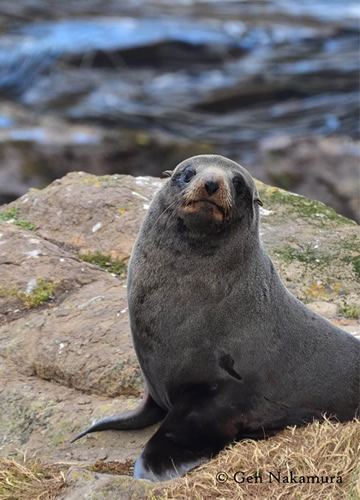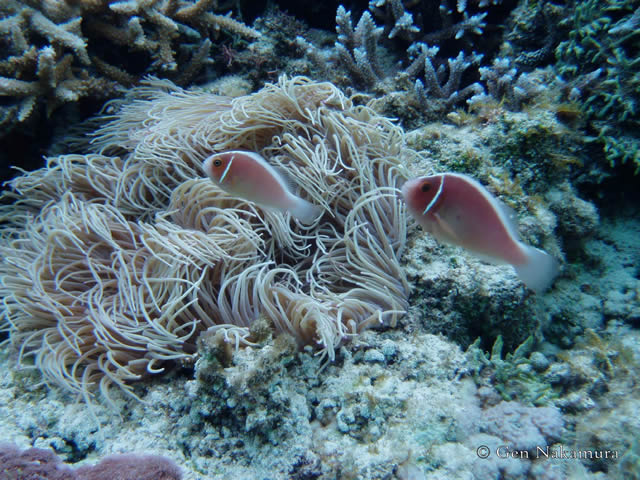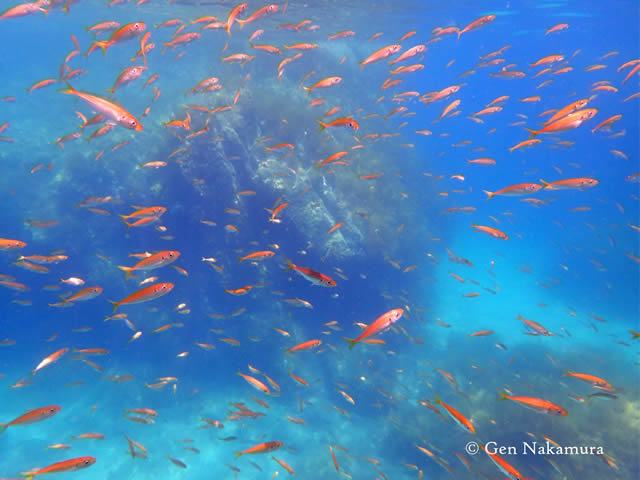Marine Ecosystem Studies
 The purpose of this course is to conduct advanced and specialized research on organisms and substances constituting the hydrosphere environment to facilitate conservation of the marine environment and effective usage of resources.
The purpose of this course is to conduct advanced and specialized research on organisms and substances constituting the hydrosphere environment to facilitate conservation of the marine environment and effective usage of resources.
We foster specialists through:
- Natural, life scientific and ecological studies of individuals or groups of marine organisms
- Studies of material cycles in the oceans and their ecosystems
- Geochemical, eco-chemical and applied biochemical studies of natural and artificial chemical substances in the hydrosphere environment
Introduction of Major Fields
Contents of research
In this course, classifications, distributions, life histories, forms, physio-ecological characteristics, interaction between organisms, population dynamics, etc., of various marine life (microbes, algae, plankton, invertebrates, fish, whales, etc.) are studied. Also, the relationship between these organisms and their environments or between their activities and material cycles are elucidated. Furthermore, useful microbes living in various hydrosphere environments and the application of the substances they produce, physiologically active substances related to ecosystems, substance sensor development and effective use of biological materials utilizing the functions of marine organisms, functions and applications of macromolecule in hydrosphere environments, existence forms and actions of various chemical substances including pollutants, etc. are investigated.
Instructional approach
It is required to understand the basics of life phenomena and substances because it is a field in which creatures and substances in the ocean environment are focused. In addition, physical factors should also be understood, such as water flow of the target hydrosphere environment.
Attractive points
The hydrosphere environments including vast deep seas have dynamics between creatures and substances that are very different from those on land, and many unknown phenomena related to creatures and substances remain undiscovered. From such aspect, marine environment research not only helps people understand marine functions in global environmental change, but is also applicable to technological development for effective usage of biological resources and environmental restoration, is one of the most critical challenges for future generations.


Class Subjects
| Advanced Ichthyology | KOHNO Hiroshi MOTEKI Masato |
|---|---|
| Advanced Phycology | SUZUKI Hidekazu KAMIYA Mitsunobu |
| Advanced Invertebrate Zoology | TSUCHIYA Kotaro |
| Advanced Planktology | TANAKA Yuji KATANO Toshiya BASTI Leila |
| Advanced Marine Ecology | ISHII Haruto |
| Advanced Population Ecology | SUZUKI Naoki |
| Cetacean Population Biology | NAKAMURA Gen |
| Aquatic Ecochemistry | NAGAI Hiroshi KAMIO Michiya |
| Advanced Aquatic Biogeochemistry | KANDA Jota |
| Advanced Marine Biochemistry | ISHIDA Masami OKAI Masahiko |
| Advanced Aquatic Biogeochemistry | TAKAHASHI Miho |
| Ichthyological Population Biology | SUNOBE Tomoki |
| Advanced Application of Biological Function | ENDO Hideaki REN Huifeng WU Haiyun |
| Advanced Chemical Oceanography | KAWAI Michiyo HASHIHAMA Fuminori |
| Advanced Functional Material | ENOKI Makiko |
| Advanced Organic Geochemistry | YAMANAKA Toshiro |
| Seafloor Hydrothermal Systems | DEKOV Vesselin |
| Ocean Chemical Sensor Observing Technology | SHITASHIMA Kiminori |
| Geomicrobial Ecology | MAKITA Hiroko |
Details of Research
Marine Biology
Contents of research
We conduct different research into organisms living in hydrospheres covering a wide range of aspects from classification to physiology, ecosystem and life history. We study not only individual organisms but also regard organisms constituting an ecosystem as a "community" to investigate how such communities react against environmental changes. Further, we engage in research activities essential to disclosure and prediction of marine environmental behavior, including establishment of measurement techniques with state-of-the-art technologies and collection and processing of vast amounts of information gained from such measurements.
Instructional approach
The students should deal with real organisms and gain morphological and ecological knowledge as basic information. To interpret such information, they should make full use of statistics and mathematics. Therefore, it is required to study with a good balance.
Attractive points
The target water areas for the research range from rivers, lakes, coasts, to the Pacific and the Southern Oceans. To study the main organisms in marine environments, we approach from an academic point of view with cutting-edge technologies, as well as classic biology.
Chemical Oceanography
Contents of research
In this course, distributions and functions of marine-chemical substances are studied, with the following purposes:
- Elucidate mechanisms and functions of the huge system called "the Sea"
- Track substances introduced by humans and evaluate the impact on organisms
- Elucidate interactions of organisms that mediate with chemical substances
- Effectively utilize biological resources and functions such as effective microorganisms and useful enzymes
- Develop technologies useful for environmental conservation and resources utilization
Instructional approach
To study the marine environment from the material aspect, it is required to understand marine biology and physics. Meanwhile, as it is a study of substances, it is also important to learn basic chemistry in a well-balanced manner.
Attractive points
Students can understand the relationship between the sea and earth environment from a global point of view, examine marine organisms microscopically, investigate any phenomena occurring in the sea from a chemical approach, and protect the marine environment.
Future
Marine research with a chemical approach is facing a new phase with development of leading-edge analysis and observation technologies. Conservation of the marine environment and effective use of resources are key elements for the future of humans. To disclose sea functions to understand the changes in the earth environment is becoming more and more important.




